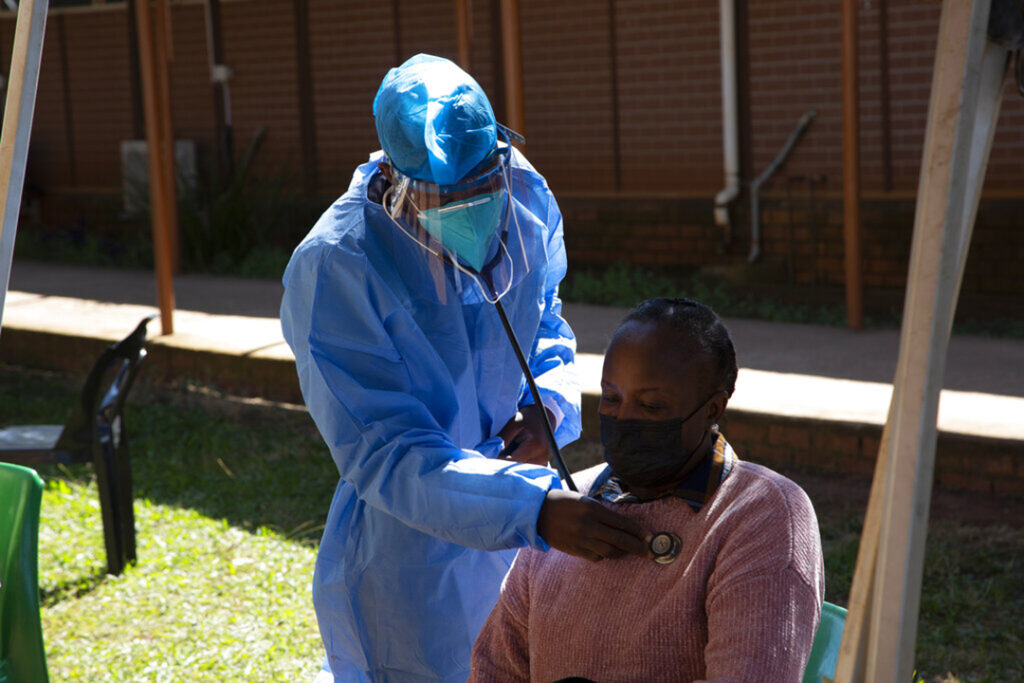ADF STAFF
Before the omicron variant of COVID-19 was discovered in South Africa in November 2021, reinfections were rare. Once a patient recovered from the virus, he or she typically did not get it again.
Omicron changed that. Now many people got sick two or more times.
More recently, omicron’s BA.4 and BA.5 subvariants have driven a wave of new infections worldwide, because their mutated spike proteins more easily penetrate human cells and cause COVID-19.
South Africa was on the leading edge of that wave in May, as the continent’s hardest-hit country experienced the latest of its five prominent waves of COVID-19 infections. In terms of hospitalizations and deaths, however, it was the mildest.
Dr. Laith Abu-Raddad, an infectious disease epidemiologist who has studied reinfections for more than a year, has an explanation.
“Existing immunity due to prior infections is high in Africa,” he told ADF. “There was already significant protection against infection with BA.4 and BA.5 in the population.”
Since the pandemic began, COVID-19 patients and researchers have wondered how long natural immunity would last.
New data analysis has shown that a symptomatic infection typically triggers a robust immune response and leaves behind antibodies that offer some protection against severe disease and death before natural immunity wanes.
A recent study by South Africa’s largest blood bank reported the presence of COVID-19 antibodies from prior infections in the blood of 87% of the population.
This explains the weaker fifth wave.
“Reinfections are milder than first infections,” Abu-Raddad said. “This reduced substantially the chance of hospitalization in the case of BA.4 or BA.5 reinfection.
“BA.4 and BA.5 are associated with only partial immune evasion, not total immune evasion.”
Abu-Raddad, professor of Healthcare Policy and Research at Weill Cornell Medicine-Qatar in Doha, co-authored a new study that looked at Qatar’s COVID-19 cases since the emergence of the BA.4 and BA.5 strains.
Although it has yet to be peer reviewed and was posted on the medRxiv preprint server on July 12, Abu-Raddad’s study shows that being infected with an earlier version of COVID-19, especially omicron, provides some immunity against BA.4 and BA.5.
The research found that prior infection with omicron was 79.7% effective at preventing BA.4 and BA.5 reinfection, compared to 28.3% for those who were infected with earlier strains.
In late July, World Health Organization Director-General Tedros Ghebreyesus warned that BA.4 and BA.5 were driving the latest surge of infections.
“In the past six weeks, the global weekly number of reported cases has almost doubled,” he said in a statement. “As the virus continues to circulate widely, new and dangerous variants are emerging.”
South Africa’s most recent wave peaked in mid-May and receded by the end of June. N ow 15 other African countries are dealing with fifth waves. Kenya and Mauritius are experiencing sixth waves.
“The immunity you’re getting from these omicron infections actually protects you from other omicron sub-lineages to some extent,” Alex Sigal, a virologist at the Africa Health Research Institute in Durban, South Africa, told Naturemagazine.
Rather than ascribing natural immunity to a particular strain, Abu-Raddad said the aim of his study was to determine who is now most susceptible to reinfection.
“Different histories equip people with different immunity against upcoming infection,” he told Nature.

